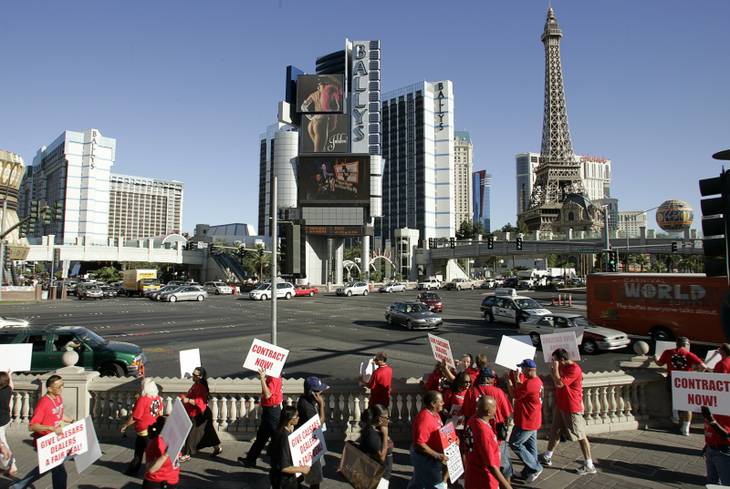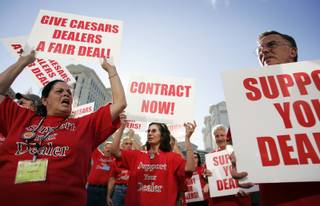Caesars Palace and the Transport Workers Union have agreed to terms on a labor contract representing some 560 casino dealers, capping years of TWU organizing and negotiating work at the historic Strip property.
A proposed 8 1/2-year contract will be presented to Caesars dealers for ratification July 26, TWU Local 721 executive Joseph Carbon said.
A Caesars spokesman confirmed Tuesday the casino had agreed with union management on contract terms for the dealers but offered no other information on the proposed pact.
For the TWU, which started Las Vegas organizing drives to represent dealers in 2000, the expected approval of the pact is significant given the status of Caesars Palace as a pre-eminent resort and a large employer. The TWU’s only other contract for dealers is with the equally prominent Wynn Las Vegas, a deal ratified in 2010.
''To have Wynn and Caesars, those are two of the premier properties on the Strip. It sends a message to all the casinos that 'we’re here to stay,''' said Carbon, the union's gaming industry director. ''At some point we’d like to organize all of them, but it’s a slow process.''
''Slow process'' may be an understatement.
Off-and-on TWU organizing drives in Las Vegas finally in late 2007 resulted in Caesars dealers voting to be represented by the union.
In the nearly five years since then, the TWU has been negotiating off and on with Caesars.
Last year, the Caesars dealers overwhelmingly rejected a proposed contract that union leadership had not endorsed.
At the time, Carbon said, it was presented as Caesars’ final offer — but dealers felt it was too friendly to the company, particularly by allowing the casino to require dealers to share tips with managers.
Those tip-sharing rights — which Caesars has not implemented — have been curtailed but not completely eliminated in the new contract agreed to by Caesars, Carbon and his TWU negotiating team.
Carbon says it’s unlikely Caesars will try to take some of the dealers' tips at least until the Nevada Supreme Court rules on a court challenge to Wynn’s tip-sharing policy.
Why would the TWU, known for representing transit workers be involved in organizing dealers?
The answer relates to the dominant Las Vegas casino union, the Culinary, not trying to represent dealers as it focuses on its core workers. So dealers desiring a union have turned to other unions around the country, and unions looking to expand have eyed the dealers.
Those included the TWU and the United Auto Workers Union, which signed the first contracts for dealers in the nation in Detroit after three casinos opened there in the late 1990s and early 2000s. As far as the UAW was concerned, Detroit was a union town and the casinos needed to be union, as well, including the dealers. The UAW later went on to represent dealers in Atlantic City while the TWU worked to organize in Las Vegas.
And why has it taken so long for any union representing dealers to gain a foothold on the Strip?
The answer is that for decades, many well-paid dealers in Las Vegas didn’t want a union and casino management resisted dealers’ unions because they wanted to maintain complete control over the dealers.

Dealer Buddy Scott counts chips during the quarter-finals of the National Heads-Up Poker Championship at Caesars Palace Monday, March 6, 2006. Heads-up poker is series of one-on-one matches with the winners advancing tournament-style until an overall champion is determined. Sixty-four players are competing for $1. million in prize money. The tournament will be broadcast on NBC in April.
That’s partly because the dealers interact extensively with valued gamblers, including high-rollers crucial to casino profits, and are in a position to handle chips and potentially participate in cheating schemes.
Nevertheless, unions ranging from the Teamsters and Operating Engineers worked as early as the 1970s to gain contracts for dealers over the years with no success.
Fast forward to 2012. With the Wynn tip-sharing policy riling up many dealers there, creating some momentum on the Strip for the union, and unions representing dealers in other states, the timing seems to have been right recently for the TWU.
And for reasons that Caesars isn’t commenting on, the casino in the past year appears to have dropped what had been stringent opposition to a contract for the dealers.
That means the TWU is poised to gain its second foothold on the Las Vegas Strip, the nation’s largest casino market.
At Wynn Las Vegas (but not sister property Encore), the TWU represents about 400 dealers, including about 200 dues-paying members, Carbon said. Dues are $36 per month at both Caesars and Wynn.
Even before finalizing the contract with Caesars, the TWU is considering trying to organize dealers at one of Caesars’ sister properties in Las Vegas, the Rio.
As far as the now-resolved sticking point over the potential of tip-sharing at Caesars, Carbon said the compromise in the proposed Caesars Palace contract means Caesars Palace can’t unilaterally adopt such a policy with dealers.
Instead, it would have to show a need to do so for competitive reasons and negotiate with the union on specific terms, all the while preserving the dealers’ right to challenge such a policy in court, Carbon said.
''There are a number of mechanisms if they were to try to take the tokes,'' he said. ''First, we have language saying the dealers and the union will never agree to it, them breaking the law by taking the tips. Some of the bigger casinos, other than Wynn and Encore, will have to take the tips. And then we would negotiate any effects.
''I don’t foresee that happening. I don’t see the rest of the casinos — the Venetian, MGM, Bellagio — doing it. They (Caesars Palace) want the right to do it, we’d still have the right to negotiate the affects.''
''If you’re going to pay people minimum wage, you need to leave their tokes alone,'' he said, adding dealers earn about 85 percent of their income from tips.
The dealers in the proposed Caesars Palace contract also received some job-security provisions like grievance and arbitration clauses, which Carbon said are important in Nevada as both a right-to-work and at-will employment state.
As a right-to-work state, no one can be required to pay union dues; ''at-will'' means employment arrangements and working conditions can be terminated or changed at any time for any reason.
Another issue was whether Caesars could adjust the longstanding practice of having dealers work 60 minutes and then taking a 20-minute break so they would remain alert and refreshed. Some casinos have moved to an 80-minute schedule followed by a break.
Carbon said the 60/20 system will be maintained at Caesars Palace under the proposed contract — though Caesars has the right to adopt the 80/20 system, but only if it does so statewide.
Existing pay, generally minimum wage, and benefits including health benefits will be maintained under the Caesars contract, Carbon said.

